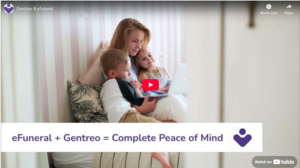
Natural disasters like brush fires, hurricanes, and tornadoes often come with little warning, leaving families scrambling to protect what matters most. Amid the chaos, ensuring your estate plan is secure can feel overwhelming—but it’s critical. Today, online estate planning tools such as Gentreo.com and its Digital Vault make safeguarding your estate plan easier than ever. These modern solutions ensure your important documents are protected, accessible, and shareable during emergencies.
As an estate planning expert (not an attorney), here’s how to protect your estate plan while prioritizing safety.
Prioritize Your Safety First
Before dealing with estate documents, ensure your safety and follow evacuation orders from local authorities. Once your evacuation plan is underway, you can address estate-related concerns as time permits.
Utilize Gentreo.com for Estate Planning
Traditional estate planning often relies on physical documents, which can be lost or destroyed in disasters. Online estate planning platforms like Gentreo.com offer a more secure, modern approach:
- Digital Vault: Gentreo’s Digital Vault securely stores your essential estate documents, such as wills, trusts, powers of attorney, and healthcare directives. Its encrypted platform protects your documents from fire, water damage, or loss.
- Anywhere Access: With internet access, you can retrieve your documents instantly, whether you’re at home, in an evacuation center, or with a trusted family member.
- Secure Sharing: Easily share access to specific documents with executors, trustees, or healthcare proxies, ensuring the right people have what they need when they need it.
- Peace of Mind: Knowing your estate plan is digitally stored and backed up allows you to focus on your immediate safety during a crisis.
If you don’t yet have a digital estate plan, platforms like Gentreo.com make it simple to create one in a matter of hours.
Prepare a Grab-and-Go Binder
While digital tools like Gentreo’s Digital Vault are invaluable, having a physical backup of essential documents can also be useful. Prepare an emergency binder with the following:
- Estate Documents: Copies of your will, trust, powers of attorney, and healthcare directives.
- Financial Information: Bank account details, insurance policies, deeds, and investment records.
- Contact List: Include your estate executor, trustees, financial advisor, and attorney.
- Medical Information: Insurance cards, advance healthcare directives, and a list of medications.
Store the binder in a waterproof, fireproof bag and keep it in an easily accessible location in your home.
Digitize and Back Up All Documents
In addition to your physical binder, digitizing your documents provides critical redundancy. Gentreo.com’s Digital Vault is an ideal solution for storing scanned copies of your estate plan, financial records, and identification. Here’s why:
- No Risk of Physical Loss: Even if your home is damaged or destroyed, your documents are safe in the cloud.
- Secure and Private: Gentreo’s encryption ensures only authorized individuals can access your sensitive information.
- Accessible on the Go: Whether you’re evacuating or returning after a disaster, your documents remain at your fingertips.
Inform Key Individuals
Communication is essential during emergencies. Inform your executor, trustee, or family members about:
- Your Emergency Plan: Share evacuation routes and temporary contact information.
- Access to Documents: Let them know how to access your Gentreo Digital Vault or physical binder.
Gentreo’s platform makes it easy to share specific documents securely with trusted individuals, reducing stress and confusion.
Keep Insurance Policies Updated
Disasters often lead to significant losses. Verify your homeowner’s or renter’s insurance policy covers damage to physical estate documents or other critical items. Store a copy of your insurance policy in the Gentreo Digital Vault for easy retrieval during claims processes.
Name Backup Executors and Trustees
Natural disasters can disrupt communication or make it impossible for primary executors or trustees to act. Ensure your estate plan includes backup individuals who can step in if needed. Platforms like Gentreo make it easy to review and update these designations as circumstances change.
Regularly Update Your Estate Plan
After the immediate crisis, reassess your estate plan to address:
- Any changes in your assets or liabilities.
- Updated contact information for family members or advisors.
- Additional lessons learned from the disaster.
Gentreo’s user-friendly interface allows you to make updates quickly, ensuring your plan always reflects your current wishes.
Fireproof and Waterproof Safes for Physical Documents
For those using physical documents, invest in a fireproof and waterproof safe for long-term storage. While helpful, physical safes are no substitute for the convenience and security of a digital solution like Gentreo.
After the Disaster: Reassess and Secure
Once the immediate danger has passed:
- Confirm the condition of your physical documents if stored at home.
- Verify that your digital estate plan in Gentreo’s Digital Vault is complete and accessible.
- Notify your advisors of any changes or concerns related to your estate plan.
Why Gentreo.com is a Game-Changer for Emergency Estate Planning
Disasters remind us how vulnerable physical documents can be. With tools like Gentreo.com and its Digital Vault, you can protect your estate plan from unexpected events, ensuring it remains secure and accessible no matter the circumstances.
By combining digital storage with traditional preparedness, you can safeguard your legacy, ease the burden on your loved ones, and focus on staying safe during emergencies. Always consult a licensed attorney for legal-specific advice to complement your estate planning efforts.
Don’t wait until it’s too late; start your estate planning journey with Gentreo today. By doing so, you’ll not only protect your loved ones but also gain the peace of mind that comes with knowing your legacy is secure. Click HERE to join now.
This article is for informational purposes only and should not be considered legal advice. Consult with a qualified attorney or estate planning professional for personalized guidance.













